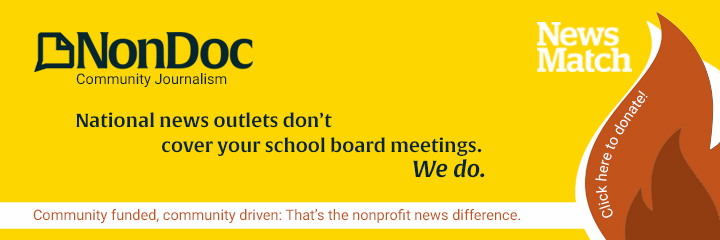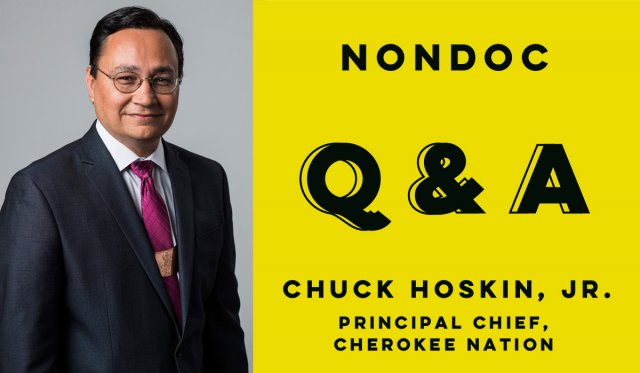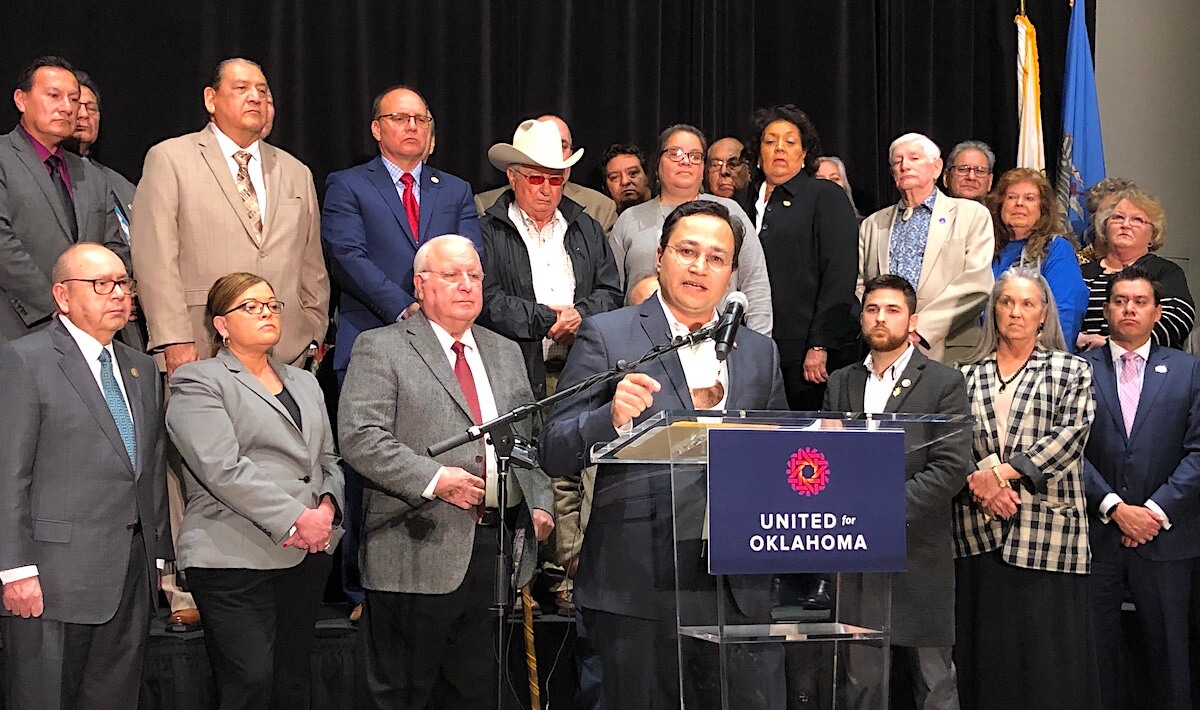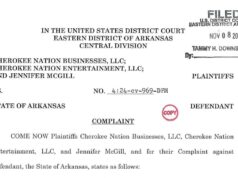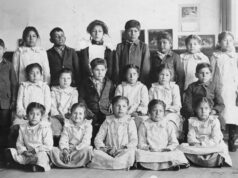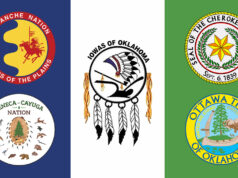
In August, Cherokee Nation Principal Chief Chuck Hoskin Jr. took his oath of office to lead the largest federally recognized tribe in the United States. The son of former Cherokee Councilman and former Oklahoma Rep. Chuck Hoskin, he also served six years on the Council of the Cherokee Nation. A graduate of the University of Oklahoma College of Law, Hoskin, Jr. lives in the Vinita area with his wife, January, and two children.
Hoskin Jr., 44, visited NonDoc’s newsroom Dec. 5 for an interview about his first 100 days in office and key issues facing his tribe. The following interview has been edited lightly for brevity and cohesion.
How have your first four months in office gone so far? What has been a pleasant surprise, and what has been an unexpected challenge?
It’s been a wonderful 100 days, in part because we had such a smooth transition between me and my predecessor, Chief Bill John Baker. I served in his administration as secretary of state, so that helped us move very quickly on things that I wanted to do.
There are a number of initiatives. One of them that has been a pleasant surprise is the reaction from members of Congress on our effort to seat the first delegate from the Cherokee Nation to the House of Representatives, which is in a 180-year-old treaty which has not been touched since that time. That has been the most pleasant surprise.
The biggest challenge has been the issues with the gaming compact. Certainly I knew going in that there would be occasion to discuss the compact with the state, but I did not anticipate that things would go the way they have gone in terms of the lack of progress, which I guess is the way to phrase it.
RELATED
More than 30 tribes ‘stand united’ against Stitt offer by Tres Savage
But [my first 100 days have] gone smoothly. We have been able to achieve some good things quickly. For example, we’ve got the largest workforce, I think, in northeast Oklahoma, and we’ve raised the minimum wage to $11-an-hour. So we continue to be ahead of the Congress on this. We continue to be ahead of the state of Oklahoma on this. We continue to pay our employees something that gets them to a livable wage when you consider all of our benefits package. It rewards them for all of their hard work, and it’s not just about raising the minimum wage. These people live in Cherokee communities. They live in rural parts of northeast Oklahoma. We are injecting — just on the government side — almost $10 million a year just to fund this wage increase. That’s $10 million a year that’s really going into spending in these communities. So to me it’s not just rewarding these employees, it’s stimulus in these areas that need it.
Because of our business revenue, it gives us the opportunity to create policy and address problems. So something I can do today that a chief a generation ago couldn’t — just because the resources weren’t there — I can look at a problem like the huge backlog we have for very low-income elders who need things for their home that you and I probably take for granted, like the floor not caving in, the roof not leaking, being able to get into our bathroom as we get on in years. So we’ve taken about $30 million just of our revenue over the next three years to wipe out this backlog and to also fix up community buildings in the communities where they live.
What are your top priorities during your first term in office?
Number one is to make sure our businesses continue to be profitable even though we have a separate governance structure for our businesses. Our business success is really rooted in the philosophy that our elected leaders allow Cherokee business people who run our businesses to run our businesses like they should be run to generate revenue. I want to continue that philosophy that our business leaders are going to make sound business decisions, not political business decisions.
I want those revenues to continue long after I’m out of office. But I also want to harness all that I can to help the Cherokees who need it the most, so that’s what the minimum wage is about, that’s what helping elders with housing is about. That’s one of our initiatives to double the amount of business revenue we commit to sending people to training programs — technical training, health care certification, IT training, trade schools — I want to make sure the people who need it the most get the benefit of the prosperity we are enjoying.
Another goal that we have is to save the Cherokee language and make it a vital part of our Cherokee communities. That is probably one of the biggest challenges we have. We are the largest tribe in the country. We have 380,000 citizens. We have citizens in every state of this country. We only have about 2,000 first-language Cherokee speakers left. Now 2,000 is a big number compared to what some tribes are challenged with, which is a much lower number of fluent speakers. But given the size of our population, it is a very low percentage. So we have to have strategies and resources in place to essentially, as those folks pass away, make sure we are replacing them with fluent speakers. So we have to do something to increase the supply of fluent speakers. The trickier part, even though that’s a challenge, is to make sure there’s the demand for it. That people we train to be speakers can live a life and make a living speaking the language, teaching the language, doing something with the language. That, I think, is the more challenging part. So we are spending $16 million — and all of that is our business revenue, it’s not a single federal dollar — to quadruple the size of our most promising language program, which is an adult-immersion program. You work for two years. You are paid for two years just to learn Cherokee because it is a complicated language.
Not to diminish your own experience, but you watched your father serve on the Tribal Council of the Cherokee Nation for 12 years and in the Oklahoma Legislature for 12 years. He was also chief of staff for former Principal Chief Bill John Baker. What has your father taught you about public service in your tribe and in the state of Oklahoma?
Without his journey into public service, I’m not sure that I would be here as chief of the Cherokee Nation. He ran for the council in 1995, and I was a teenager. It sort of opened up a whole world to me of not only opportunities in politics but what you can do as an elected official if you work hard and try to be a voice for people who otherwise would not have a voice. That’s the way I always saw him when he served on the council, when he served in the Legislature. So that’s probably the best lesson he has taught me. If you have this opportunity to serve in public office, number one, it may seem like a while, but it’s really just a sliver of time. You don’t know how long you’ll have, and you should use that time to try to be the voice for people who wouldn’t have a voice, who don’t have somebody fighting for them so they can go to trade school or go to college or so their grandmother can have a roof over her head.
And frankly the opportunities. Let’s face it. If your father enters into politics and enjoys some success, I’m not so proud as to say that didn’t open up opportunities to me. It just did. It exposed me to people and ideas and opportunities that I’m fortunate to have had.
I’m confident I wouldn’t be chief right now — and I’m certain I wouldn’t be as effective a chief as I think I have been — without his example.
The big political issue in Oklahoma currently is the difference in opinion between tribal leaders like yourself and Oklahoma Gov. Kevin Stitt about the Model Gaming Compact — whether it renews automatically or not. We know you say it renews Jan. 1, but what are you hearing from your citizens about how this disagreement is playing out?
I have not heard anyone say any different than this, which is essentially: “Stand your ground. The Cherokee Nation is right. The tribes are right. It’s not broke, why try to fix it?” And when we talk with our citizens about why the compact renews, I think like most people they get it.
I feel like I’ve got all 380,000-plus citizens behind me cheering me on to make sure we have a fair compact in the end.
Gov. Stitt is an enrolled citizen of the Cherokee Nation, so the two of you actually represent one another. How well did you know each other before this dispute started making front-page headlines? How would you describe his connection to the Cherokee Nation in the past, currently and for your hope in the future?
I did not know him before he became governor. I’ve had just a few very brief conversations with him since he took office. I was not aware he was a Cherokee citizen until late-summer or fall of 2018 when his election was — which, given that he’s in a tribe of 380,000 citizens with Cherokees all over the country, doesn’t speak to one’s Cherokee-ness just because I didn’t know he was Cherokee. There are a lot of Cherokees out there. I just did not know he was Cherokee. But I was glad to know he is Cherokee. I was and remain encouraged that his citizenship in the Cherokee Nation will help inform his judgement as a leader.
What percentage of Cherokee Nation Businesses’ revenue is related to casino gaming? What are the other industries you are focused on building?
It’s roughly 60/40 (percent) — the 60 (percent) being gaming related. The non-gaming portion of it, number one, is growing. It’s largely federal contracts ranging all different services. It could be logistics on a military base. It could be information technology or security, some construction management, health care construction. We are involved in some drone technology. That sort of thing.
I heard the other day (we are in) all 50 states and 14 countries around the world. I’m surely going to leave some out, but we are developing our capacity to perform on these contracts as we get more of them. Those are competitive, and I’m proud that we compete and win. Last year, I think we had close to $1 billion in contract wins. But as we continue to be successful in those contracts, the idea is that success will build upon success.
(With) most of these jobs, the direct employment for these contracts quite naturally are out where the site is in the 50 states where we have different federal contracts. But one thing that it’s important for Oklahomans to know is that, of our 11,000-odd employees, there are 600-plus that live and work in Oklahoma supporting these contracts. As the success grows outside of the Cherokee Nation, the revenue comes back into the Cherokee Nation and into the state of Oklahoma, building up support jobs and providing opportunities to do other things.
Pre-dating gaming is some manufacturing, particularly in Stilwell where Cherokee Nation Industries dates back to the late 1960s. Again, they are performing work on a subcontract basis, ultimately for the military and helicopter companies. But that provides employment in Stilwell, and we do some light manufacturing in Pryor.
My hope and goal — and I think we have the right business people in place to do this — is to increase the diversity of our businesses within the 14 counties so that we find other business opportunities outside of gaming in the northeast Oklahoma region, because I think that will generate more employment. I think even though gaming has been good and we are on a steady trajectory of success in gaming, any industry is susceptible to ups and downs, and I think we can have a hedge against that if we have more diversity within the region.
How is gaming changing in the digital age?
At present when you go into a casino, it certainly looks different than it did 20 years earlier and 20 years before that. So much is driven by electronics and gaming and imagery. That’s just part of the marketing and part of staying at the top of the market.
There are always — lately — discussions of sports betting (and) internet gaming. We’re not engaged in either of those, even though those are on the landscape. I suspect in 20 years there will be opportunities for both, but it’s not our present focus. Our present focus is taking what we have and making sure we stay at the top of the market and have games that draw people into the facilities. I’m not an expert on gaming, but I think like most people I see technology changing at a breakneck speed. And we live in a day and age where it’s legal — perhaps in some parts of the world it is not — and a person could engage in the same kind of gaming experience from their home as they do in a casino.
Part of our approach to gaming, though, is it’s more of a complete experience, and we are providing things beyond gaming in our facilities that we think you can’t substitute by being on your phone somewhere else. We have a very successful music venue at the Hard Rock (Hotel and Casino) called The Joint, which brings in a lot of pretty high-named acts given that it’s not a huge facility. But it’s a great experience. Part of our casino expansion recently included another music venue there at the Hard Rock. So that tells me that the market in our area is demanding not only gaming but also the rest of the experience, which is also entertainment.
Can you give us an update on the dynamic between the Cherokee Nation and its Freedmen descendants? How do you move forward in a way that is good for all parties?
I think things are progressing very well. Just by way of reference, it was September 2017 that the federal court issued its decision defining what the Treaty of 1866 meant when it said that Freedmen descendants (of former slaves) shall have the rights of native Cherokees. One thing that doesn’t get a lot of attention is that the Cherokee Nation Supreme Court issued a very similar order shortly thereafter. So very much it is undisputed law of the land that Cherokee citizens are equal based on their citizenship irrespective of their descendancy. That’s something that I have believed in since the issue came up.
I was secretary of state when that came down, and I think that’s helped me as chief because (it is) one of the things Chief Baker tasked me with in 2017 after the decision came down. We had a conversation about the idea that, yes, the decision has been issued, but the real work in terms of unity comes after that. It doesn’t happen just at the issuance of a decision.
So one of the first things we did was have outreach events to citizens of Freedmen descent and those who could be citizens once they applied. Because for a century to have been disconnected and then have been legally excluded from the Cherokee Nation, many in the Freedmen community wouldn’t have had the same experience, the same access to services, the opportunities and understanding of citizenship because of that disconnect. So we wanted to bridge that gap, and I’ve been doing that fairly steadily since 2017 and continue to do that. There are Cherokee citizen community organizations throughout the 14 counties. Some of them are predominantly Cherokee citizens of Freedmen descent, and we work with them on issues they care about and are important just as we do any other Cherokee organization, providing funding and other opportunities.
I’m very mindful that we need to make sure all of our services and all of our accessibility to the government is done based on that core principle of equality, and that even if overt or hostile discrimination is wiped away, there can sometimes be inadvertent acts that exclude people based on their descendancy, and I want to make sure that doesn’t happen in our government. I talk to staff all the time when those issues come up, and I talk to leaders in the Freedmen community about those issues, and I feel like we have a great relationship and that the opportunities that are afforded to all Cherokee citizens are just that: afforded to all Cherokee citizens.
What is a fun fact about yourself that many people may not know?
This comes to mind only because I’ve started watching it more lately, but I’m on the board of RSU-TV public television (at Rogers State University). One of my favorite shows of all time is a show that the director of that can’t stand — and we kid each other all the time; I say, “You need to have this on prime time” — and that’s Mystery Science Theater 3000. So I’m a huge MST3K fan, and I don’t think anyone knows that or would care to know it even if you printed it.
(Clarification: This post was updated at 9:10 a.m. Tuesday, Dec. 31, to provide a more-correct perspective of funding for the Cherokee Language Master Apprentice Program.)
